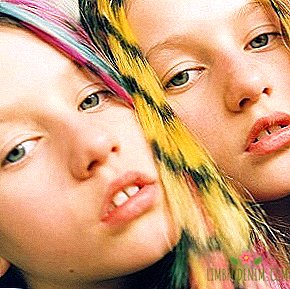Top Manager Malin Yonin on how to manage IKEA
IN RUBRIC "BUSINESS" we introduce readers to women of different professions and hobbies that we like or are simply interested in. This time Malin Yonin, deputy director of the IKEA Russia retail chain, became our heroine.
I was born and worked in Sweden, where I studied management in sports - at the Swedish University Bosön Sport Management Sweden. At that time I was actively training myself, so I chose this direction. Before IKEA, I managed to work in different places, a lot was connected with work with young people. I also collaborated with small projects and managed them - for example, I organized a sports camp from scratch.
After graduation, I chose between the work of a physical education teacher in Stockholm and the opportunity to move to Switzerland to play there in the hockey team in the gym. I thought that it would be interesting for me to live in another country for a year or two, and moved - but I quickly realized that I would like to have a “normal” job. Then I wondered: why not IKEA? I am from Sweden, IKEA is also from Sweden, the company is very familiar to me. In the first years in the new country, I continued to study: I received a bachelor's degree in business management and a master's degree in marketing.
At first, I was an ordinary employee, but then because of my love for leading people and developing business through employees, I was assigned new responsibilities - first I became the head of the group in the sales department, then the head of the sales department, and then the store director in St. Gallen. It was already like managing the whole company. And although the responsibility has grown, the methods of work have not changed: I sincerely believe that it will not work if you don’t develop business through people.
About moving to Russia and adaptation
People often ask me if it was easy for me to move to Russia. Why can a person decide to move here from Switzerland? I have three good reasons. A year before the move, I visited Russia - I supported local personnel development projects, and I really liked the people I met. It is also important that Russia is a strategically important market for IKEA, and I have much more responsibilities here than there were before. In addition, there is a large integrated business here: a distribution center, and MEGA shopping and entertainment centers, factories, and procurement. All this implies diverse interesting tasks. Besides, it seems to me that one of the best ways of self-development is to get acquainted with different cultures and look at the world from a new perspective. I noticed this when I moved from Sweden to Switzerland. For me, probably, today is the most important thing: I think that if you develop personally, you will be much better and as a professional.
Adapting to life in Russia was not difficult. I think I could live anywhere. The most difficult are applied things, for example, driving in Moscow. Or airports - yesterday I arrived there late, and there was a huge queue at the passport control - you need patience to stand and wait. You are moving to a city where more people live than in all of Switzerland. This may not be easy, but it does not concern the attitude towards the country as a whole.
I think there are cultural differences between all countries, but it seems to me wrong to generalize. When you work in a company with a single system of values, a strong culture, you see a lot of similar things - and everywhere you feel the spirit of IKEA. But yes, work in Russia is different from work in other countries - for example, in speed or how decisions are made. Russia is perceived as something single, but it is a very large and diverse country with a complex culture. At the same time, for example, in Switzerland, a very small state, there are four official languages that imply very different cultures. This is also very interesting.
About working at IKEA
IKEA has a CEO in Russia, and he has three deputies. My current position can be described as a vice CEO - or deputy general director. I make sure that the IKEA offer meets the needs of buyers in Russia, makes their home better. When you as a customer come to us for shopping, online or offline, we want you to have a pleasant experience that you would like to repeat. Then there are a few additional questions: do you want to pick up a purchase in the store or that you get it home, and so on. I work on it too. In addition, I, of course, visit many of our sites - we have fifteen of them in Russia.
I travel a lot around the regions, meet people, visit them to see how they live, and what we can do to improve their daily activities. I was in Adygea, Novosibirsk, Rostov, St. Petersburg, Ufa, Samara, Kazan, Yekaterinburg, Nizhny Novgorod - traveling throughout the country. They say to me: "You probably saw more in Russia than we did." This is a very good country, there are many nice places and nice people.
I think that in order to work in IKEA, we need to understand and share our values. For example, we constantly check whether an employee is ready for improvement, and employees need to work better every day than they did yesterday. We strive for constant renewal and improvement - if you hate all this and peace of mind is important to you, it will be hard for you in a company like ours. Our way of working determines which employees come to us. Leadership is also important for us and for people to take responsibility. We do not have the principle of "top down" - we have a horizontal hierarchy, and we are working with the whole team to solve problems. Leadership culture is one of the biggest differences that people face when they come to work with us.
How to be a woman in top management
I have two brothers - ten and twelve years older than me. We constantly competed, but they never thought that I couldn’t do anything because of my gender: they always said that I was too small for something, but never that I was a girl. I have had little experience with sexism, although I do not always correspond to other people's ideas about how an IKEA top manager should look. This happened several times at presentations and meetings in different countries, people did not believe that I was me. They asked: "Mr. Jonin?" And I said it was me, Malin. I do not take it to heart. In IKEA, we in all countries work a lot on diversity, which includes not only gender equality. At the same time, I think that a woman to build a career in IKEA is no more difficult than a man. In some countries there are additional nuances - for example, is there a woman where to leave the child, and so on. But in IKEA, we are well aware of the balance of men and women, and in Russia, even a bias in the other direction: 61% of our managers are women, and among top managers, 70-80% of women.
What helps me to relax? I have a dog. They are not interested in my work at all. When I come home, they don’t ask why I haven’t been for such a long time or why I’ve been late - they are just happy and want to walk. When I go out with them, I calm down. This is a great time to reflect - they are getting older and are no longer moving very fast, so I also have to go slower. I also like to go in for sports - unfortunately, I’ve gotten less often lately, but I like it a lot.





